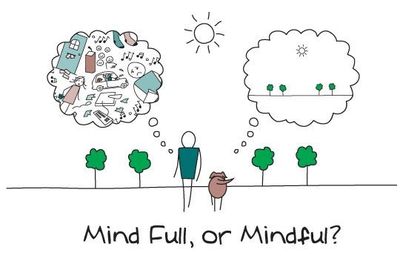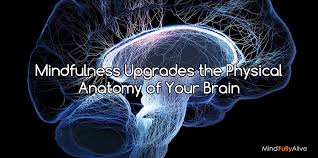
Mindfulness can be described as paying attention to the present moment, being careful not to be pulled off into the mind’s usual elaborations of judgment or internal dialogue. It is being with our experience with gentle compassion and a disciplined intention to simply stay present with whatever is happening in the moment, allowing space for experiences to rise up and fall away without adding our usual overlay of grasping, disappointment, frustration or panic.
MBSR is an 8-week intensive life-enrichment program that provides effective tools for establishing a daily mindfulness practice leading to a more healthy, rewarding and balanced lifestyle. The 8-week model is designed to carry the participant through the struggles and relapses that so often accompany any significant behavioral change – it takes time and effort to break up the foundations of unskillful habits and construct a foundation of mindful awareness upon which skillful, life-enhancing habits can then be established and cultivated. Training often includes both formal practices – sitting, walking, eating meditation in combination with mindful movement (Hatha yoga, chi gong) and a host of informal practices – interpersonal dialogue (mindful listening and speaking), skillful consumption (food, TV, news, movies, alcohol, caffeine, etc.), periodic “checking & dropping in” practices (e.g. quick body scan, belly breathing, key tension area check-in and release). Many alumni describe their experience with MBSR as “transformative.”
 MBSR is a challenging and rewarding program generally with 20 hours of class time, lots of reading material, worksheets and drawings (yoga and perspective shifting) and perhaps a selection of YouTube videos. Resources are provided for maintaining one’s mindfulness practice following the program. This extensive “mindfulness toolbox” supports not only the cultivation of a host of mindfulness skills but also their broad integration into everyday life. (You might enjoy this this recent 22-minute video with Jon Kabat-Zinn and/or to learn about the early days of MBSR and it's impact on hospital patients on this Bill Moyers & Jon Kabat-Zinn 90 minute PBS Special "Healing and the Mind.")
MBSR is a challenging and rewarding program generally with 20 hours of class time, lots of reading material, worksheets and drawings (yoga and perspective shifting) and perhaps a selection of YouTube videos. Resources are provided for maintaining one’s mindfulness practice following the program. This extensive “mindfulness toolbox” supports not only the cultivation of a host of mindfulness skills but also their broad integration into everyday life. (You might enjoy this this recent 22-minute video with Jon Kabat-Zinn and/or to learn about the early days of MBSR and it's impact on hospital patients on this Bill Moyers & Jon Kabat-Zinn 90 minute PBS Special "Healing and the Mind.")
Making time for these practices is often the first significant challenge in committing to the program. This “cleaning out one’s life closet” requires a honest evaluation of personal habits and lifestyle choices which can shake things up a bit especially for those who struggle with chronically over-booked schedules, dysfunctional relationships or addictions. The insights and skills that are the fruit of this program can lead one away from such mindless, life-consuming habits. Interestingly, some participants do little of the homework and only attend the classes and despite of this limited investment, report significant positive benefits.
Foundations of an Effective MBSR Program

• Cultivation of mindfulness. "Mindfulness” can be defined as being aware of what’s happening within and outside of the body/heart/mind without adding the usual overlay of judgment, commentary or decision making. This allows fear, anxiety or confusion, which so often result from such internal dialogue, to be avoided. As the foundation of Cultivating Mindful Relationships, the cultivation and stabilizatiojn the skill of mindfulness is woven into many aspects of the program.
• Shift of perspective from narrow (constricted, isolated and urgent) to open (expansive, connected and relaxed). Ordinary objects (e.g., raisins) and practices (e.g., awareness of breathing and stretching) in nuturing (mindful, calm, quiet and focused) environments combined with pointing out instructions and illustrations (old woman/young girl) and inspirational writings (poetry) offer glimpses of a broader perspective and deepen capacity to shift between narrow and open focus.
• Ability to detect subtle bodily sensations including minor tensions and contractions associated with reactive patterns/habits/emotional triggers. This allows for a quick periodic check-in throughout the day and especially during stressful times, so that relatively minor tension can be released to prevent physical and emotional tension from accumulating. Emotional triggers can be identified so that skillful responses can replace mindless reactivity, which allows a shift toward healthy and productive choices. This skill is developed, deepened and stabilized by using eating and walking meditation, the body scan, Hatha yoga and Qigong practices within a supportive group context.
• Ability to rest in discomfort with equanimity and maintain a clear/focused mind, relaxed body and open heart. This skill is developed cognitively by working with uncomfortable thoughts, feelings, and bodily sensations. (As participants experience them; none are intentionally induced as part of the program.) Participants are encouraged to relax in the presence of such discomforts and to gently move their attention toward them. These practices provide potential for insights into how conditioned reactions to minor discomforts underlie much of our suffering and unskillful reactions to the people in our lives. These insights often encourage participants to deepen their commitment to a daily mindfulness practice.
• Capacity for establishing a trusting interpersonal connection. This is clearly an important aspect of our Cultivating Mindful Relationships program and also a core element of our other mindfulness training programs. The facilitators create and hold a safe space in which participants feel comfortable in sharing their struggles, failures and successes in establishing their mindfulness practice. The importance and power of being open, honest and vulnerable is highlighted. There are small group and dyad exercises in which participants first meditate together and then share an experience, for example, a time when they felt most alive, honest or integrated. Periodically, during this exercise, a bell will signal them to check-in internally and become centered before re-engaging with their partner. Such guided communication activities help cultivate the capacity to establish and maintain an inner stillness throughout a conversation, which invites one to listen and speak from their most authentic and integrated self.
• Openness to emotional healing, personal & Spiritual growth. Mindfulness practice brings one’s focus to the arising of sensations and contractions within the body thereby avoiding becoming hijacked or overcome by random thoughts or powerful emotions. A shift to a more open, curious perspective allows an interruption of the chain of reactivity that gives the emotional and physical energy room in which to rise up, be witnessed and owned, and processed and released. This natural self-healing process is often appreciated as another helpful fruit of regular mindfulness practice.
 Many years of empirical research has shown that it is not the stressor itself, but how it is perceived and what the mind/body does in reaction/response to it that determines whether we experience “distress.” By cultivating mindfulness we learn to relate to our experience with relaxed equanimity. With this skill, we can move from mindless reactivity to skillful response, from a sense of urgency to calm inner peace. With disciplined practice, the mind begins to settle down and we may be blessed with moments of profound stillness and silence. We may touch our inner source of wisdom or a flood of compassion may arise. These moments change the way we interact with the world. We become more loving and patient, more courious and playful. We engage our life with more discipline and courage.
Many years of empirical research has shown that it is not the stressor itself, but how it is perceived and what the mind/body does in reaction/response to it that determines whether we experience “distress.” By cultivating mindfulness we learn to relate to our experience with relaxed equanimity. With this skill, we can move from mindless reactivity to skillful response, from a sense of urgency to calm inner peace. With disciplined practice, the mind begins to settle down and we may be blessed with moments of profound stillness and silence. We may touch our inner source of wisdom or a flood of compassion may arise. These moments change the way we interact with the world. We become more loving and patient, more courious and playful. We engage our life with more discipline and courage.
For over 30 years, a growing body of clinical research has demonstrated MBSR’s effectiveness as a powerful, integrated approach to coping effectively with physical, psychological and interpersonal stress as well as pain, illness and addiction. It is used in complementary medicine and wellness programs in universities and hospitals throughout the world. For many, this program provides a solid foundation not only for a life-long meditation practice but also for deep emotional healing and spiritual growth.
Participants of MBSR programs consistently demonstrate and report long-lasting improvements such as: - Improved health-related quality of life - Increased sense of life meaning and manageability - Significantly reduced anxiety & depression - Enhanced self-esteem and activity levels - Reduced chronic pain and physical distress - Fewer and less severe panic experiences - Strengthened immunity - Increased social activity and vitality - Reduced tension, anger, and fatigue - Improved sleep quality - Reduced pain-related drug use - Improved emotion regulation, reduced anxiety - Decreased blood pressure - Optimal states of relaxed alertness - Decreased psychiatric hospitalizations - Reduced harmful behaviors - Reduced substance abuse - Decreased interpersonal problems - Fewer and less intense headaches - Increased brain activity associated with positive emotion.
Learn more about the empirical research demonstrating benefits of MBSR on the website of Center for Mindfulness in Medicine, Healthcare and Society. And/or read two excellent review articles supporting the effectiveness of MBSR and mindfulness training with a growing number of emotional disorders and physical illnesses as well as the enhancement of mental and psychological function in healthy populations. More info here as well.
If you're self-motivated, you may benefit from engaging with this free on-line MBSR program.